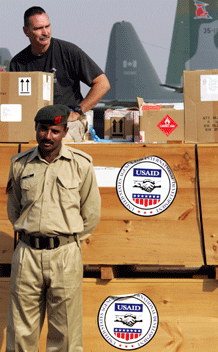Foreign Aid and Lousy Choices
More on:

At last Thursday night’s GOP presidential debate, Butch Russell asked a video question that received the most online votes of any question submitted about foreign policy. As debate questions go, it was blunt:
When are we gonna get someone in the White House that can stand up to these other countries and say you are not getting any more of our money. This is stupid. We send billions of dollars overseas to countries that hate us.
Newt Gingrich got to answer the question. He might have noted that less than one penny of every federal dollar goes to foreign aid, or that the United States is among the least generous OECD nations when it comes to foreign aid as a share of its economy, or that a lot of U.S. aid goes to countries such as Israel that are staunch U.S. allies. He didn’t say that. He said instead that while he historically has supported international assistance, he now thinks it needs to be rethought. Given his audience, the speaker’s answer was politically savvier than the one I would have given.
In any event, the Russell-Gingrich exchange was in the back of my mind over the weekend when two news articles caught my attention. The stories weren’t limited to foreign aid per se, they also extended to security assistance as well. But the upshot of both articles is that the problem that bothers Mr. Russell can at times be worse than he imagines. Some U.S. tax dollars end up the in hands of people who don’t just hate Americans but are actually trying to kill them.
The first story was an excellent piece the New York Times ran yesterday on the Haqqani network, which was behind the attack on the U.S. embassy in Kabul earlier this month. Here’s the passage that caught my eye:
Over the past five years, with relatively few American troops operating in eastern Afghanistan, the Haqqanis have run what is in effect a protection racket for construction firms—meaning that American taxpayers are helping to finance the enemy network.Maulavi Sardar Zadran, a former Haqqani commander, calls this extortion “the most important source of funding for the Haqqanis,” and points out that a multiyear road project linking Khost to Gardez in southeastern Afghanistan was rarely attacked by insurgent forces because a Haqqani commander was its paid protector.
“The Haqqanis know that the contractors make thousands and millions of dollars, so these contractors are very good sources of income for them,” he said in an interview.
Similarly, Fred Kaplan noted in a terrific analysis of Pakistan’s aims in Afghanistan that the United States may cut some of its military aid to Pakistan because elements of the Pakistani military and intelligence services are bankrolling the Haqqani network. The proposed aid cutoff:
is something that the Pakistani military, which receives $2 billion a year in U.S. security assistance, genuinely fears. Successive American presidents have continued this aid, despite knowing that some of the money goes to support militants.
The solution might seem obvious: get out of Afghanistan, cut off aid to the Pakistani military, or possibly both. But a sharp drawdown in U.S. forces in Afghanistan could mean turning much of the country over to the Taliban, and a complete withdrawal could mean the collapse of the Karzai government. As for slashing U.S. military aid to the Pakistanis, Kaplan points out that “if the aid is cut off, the [Pakistani] support for militants may well intensify.”
Sometimes the choices you face in foreign policy forces can best be labelled "bad," "awful," and "terrible."
More on:
 Online Store
Online Store